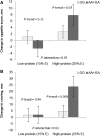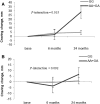Dietary Protein Modifies the Effect of the MC4R Genotype on 2-Year Changes in Appetite and Food Craving: The POUNDS Lost Trial
- PMID: 28148682
- PMCID: PMC5320402
- DOI: 10.3945/jn.116.242958
Dietary Protein Modifies the Effect of the MC4R Genotype on 2-Year Changes in Appetite and Food Craving: The POUNDS Lost Trial
Abstract
Background: The melanocortin-4 receptor (MC4R) plays a pivotal role in the regulation of appetite and eating behavior. Variants in the MC4R gene have been related to appetite and obesity.Objective: We aimed to examine whether weight-loss diets modified the effect of the "obesity-predisposing" MC4R genotype on appetite-related measures in a randomized controlled trial.Methods: A total of 811 overweight and obese subjects [25 ≤ body mass index (BMI; kg/m2) ≤ 40] aged 30-70 y were included in the 2-y POUNDS Lost (Preventing Overweight Using Novel Dietary Strategies) trial. We genotyped MC4R rs7227255 in 735 overweight adults and assessed appetite-related characteristics, including craving, fullness, hunger, and prospective consumption, as well as a composite appetite score. We examined the effects of the genotype-by-weight-loss diet intervention interaction on appetite variables by using general linear models in both the whole population and in white participants only.Results: We found that dietary protein intake (low compared with high: 15% of energy compared with 25% of energy, respectively) significantly modified MC4R genetic effects on changes in appetite score and craving (P-interaction = 0.03 and 0.02, respectively) at 2 y, after adjustment for age, sex, ethnicity, baseline BMI, weight change, and baseline perspective phenotype. The obesity-predisposing A allele was associated with a greater increase in overall appetite score (β = 0.10, P = 0.05) and craving (β = 0.13, P = 0.008) compared with the non-A allele among participants who consumed a high-protein diet. MC4R genotype did not modify the effects of fat or carbohydrate intakes on appetite measures. Similar interaction patterns were observed in whites.Conclusion: Our data suggest that individuals with the MC4R rs7227255 A allele rather than the non-A allele might experience greater increases in appetite and food craving when consuming a high-protein weight-loss diet. This trial was registered at clinicaltrials.gov as NCT00072995.
Keywords: MC4R genotype; appetite; food craving; gene-diet interaction; protein diet; weight-loss trial.
© 2017 American Society for Nutrition.
Conflict of interest statement
Author disclosures: T Huang, Y Zheng, A Hruby, DA Williamson, GA Bray, Y Shen, FM Sacks, and L Qi, no conflicts of interest.
Figures


References
-
- Cole SA, Butte NF, Voruganti VS, Cai G, Haack K, Kent JW Jr, Blangero J, Comuzzie AG, McPherson JD, Gibbs RA. Evidence that multiple genetic variants of MC4R play a functional role in the regulation of energy expenditure and appetite in Hispanic children. Am J Clin Nutr 2010;91:191–9. - PMC - PubMed
-
- Stutzmann F, Cauchi S, Durand E, Calvacanti-Proenca C, Pigeyre M, Hartikainen AL, Sovio U, Tichet J, Marre M, Weill J, et al. Common genetic variation near MC4R is associated with eating behaviour patterns in European populations. Int J Obes (Lond) 2009;33:373–8. - PubMed
Publication types
MeSH terms
Substances
Associated data
Grants and funding
LinkOut - more resources
Full Text Sources
Other Literature Sources
Medical

